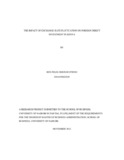| dc.contributor.author | Otieno, Ben FO | |
| dc.date.accessioned | 2013-02-28T14:15:59Z | |
| dc.date.issued | 2012 | |
| dc.identifier.citation | MBA Thesis 2012 | en |
| dc.identifier.uri | http://erepository.uonbi.ac.ke:8080/xmlui/handle/123456789/12525 | |
| dc.description | Master Thesis | en |
| dc.description.abstract | Kenya has been the business hub for East and Central Africa and is keen to retain this status
towards realizing the vision 2030. Such regional economic leadership cannot be financed
solely by domestic capital hence the need for foreign direct investments to cover the gaps in
her socio-economic agenda towards the vision.
The main objective of this research project hence is to examine the impact of exchange rate
fluctuations on the much needed foreign direct investments in Kenya. The exchange rate
regimes in Kenya have been influenced through historical government macroeconomic policy
from fixed exchange rate regimes to pegged and later floating through liberalization in the
nineties. The exchange rates have been characterized by significant fluctuations with the local
currency hitting historical highs and lows. This volatility of the nominal exchange rates might
have an impact in attracting of foreign capital inflows into the country yet no study has been
carried out so far in Kenya to determine the correlation between these two variables.
All the sectors of the Kenyan economy were the target population for this research project.
Time series data for exchange rate fluctuation and foreign direct investments to Kenya
between 1981 and 2010 were collected from Central Bank of Kenya and the World Bank
Country data websites for analysis. The standard deviations for the exchange rates were
derived for each year under study to determine the fluctuations. The absolute figures of the
foreign direct investments data to Kenya was transformed through logarithmic transformation
for normalization purposes. Pearson moment correlation was used to examine the relationship
between exchange rate fluctuations and foreign direct investments over the period of study.
The variables were plotted against on a graph and a best line of fit determined to generate the
linear statistical model for their relationship.
From the collected data it was observed that while 1987 and 2002 recorded the lowest
fluctuations in exchange rates and fairly low net foreign capital inflows into the country,
conversely 1993 recorded the highest exchange rate fluctuations and the relatively high
foreign direct inflows. This should point at a strong relationship between the two variables.
However the inferential analyses found a weak relationship between exchange rate
fluctuations and foreign direct investments. The best line of fit also revealed a positive for
exchange rate fluctuations plotted against the logarithm of net foreign direct investments in
current prices of tens of millions of United States dollars. This means that an increase in the
exchange rate fluctuations leads to an increase in the foreign capital inflows. However this
finding is made less important by the insignificant relationship between the two variables.
Hence the conclusions drawn from this study finding suggest that the impact of exchange rate
fluctuations in attracting FDI is insignificant.
This study recommends that policy makers should put less effort in influencing exchange
rates fluctuations in the bid to attract foreign direct investments to the country to fuel our
Vision 2030 pillars. However more effort and further research should be focused on the other
determinants of FDI with significant impact on the inflows. With emerging sectors like the
energy sector and the growing interest in emerging markets in Africa by Nations like China,
it would be good for more research to be conducted using alternative methodologies to
improve knowledge on the main determinants of FDI to enable Kenya not only retain its
economic leadership in the region but also attain mid-income level. | en |
| dc.description.sponsorship | University of Nairobi | en |
| dc.language.iso | en | en |
| dc.subject | Investment,Capital,Exchange fluctuation,Variables | en |
| dc.title | The impact of Exchange Rate fluctuation on foreign direct Investment in Kenya | en |
| dc.type | Thesis | en |
| local.publisher | School of Business, University of Nairobi | en |

